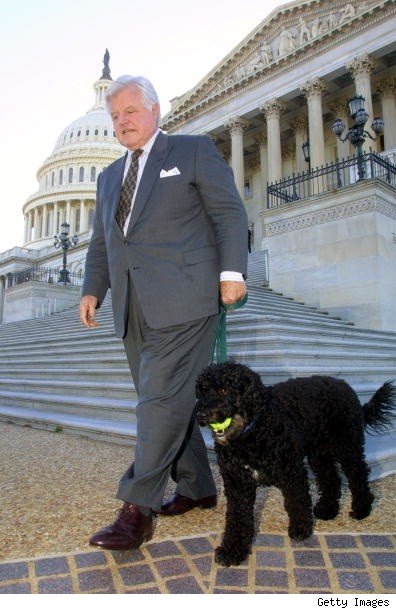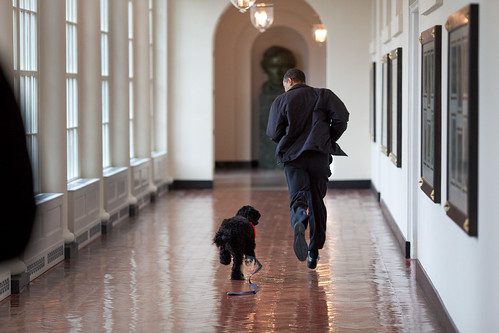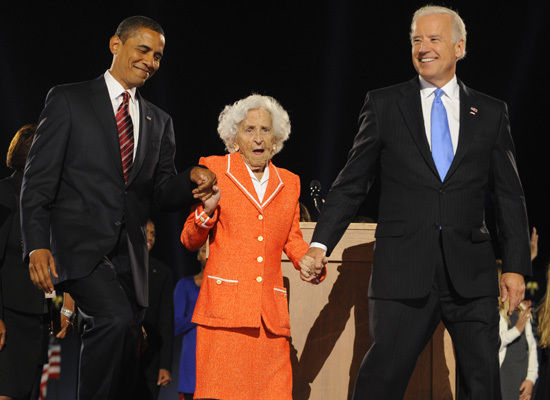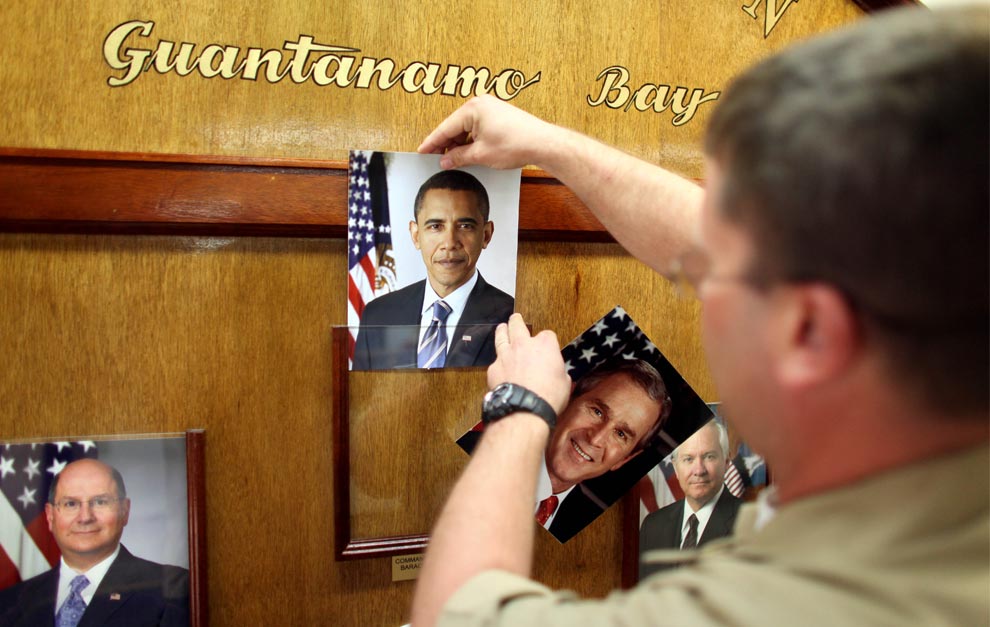
Representative Wilson, the President is ready to see you.

 I have an assignment for you. Please go read this post by Margaret and Helen. Go on, I'll wait here iwth Monkey Stick.
I have an assignment for you. Please go read this post by Margaret and Helen. Go on, I'll wait here iwth Monkey Stick.

With the exception of the Senate floor, there were few places Splash, Sunny and Cappy didn’t have access to, including committee hearings and, once, even the Oval Office. It was a rare day when the Massachusetts lawmaker wasn’t shadowed by at least one of the pooches, whether Kennedy’s schedule brought him an office full of visitors or a committee bill markup.
A powerful man with a booming voice and a formidable family legacy, Kennedy often used his dogs to break the ice with Republican lawmakers, to relax nervous visitors and to put political personalities to the sniff test.
...But Kennedy's dogs weren’t saints either. Like a parent of spoiled children, the senator was loving but a poor disciplinarian.
Splash has been known to bark impatiently during long meetings. The dog once sent White House staffers into a frenzy when the pooch began barking in the Oval Office. Kennedy and his pets were at the White House waiting for the start of a religious freedom bill signing ceremony with President Clinton.
 The dog at the Portuguese Water Blog (Ha! I love a good play on words) remember Ted as a compassionate guy who worked hard for their breed. I wanted to end this sad week with a happy photo of Ted and his dog, taking care of business! I'd like to think that this guy has a mischevious look in his eye not only because he's getting to play ball at the Capitol but because he left a little "present" for Chuck Grassley under his desk.
The dog at the Portuguese Water Blog (Ha! I love a good play on words) remember Ted as a compassionate guy who worked hard for their breed. I wanted to end this sad week with a happy photo of Ted and his dog, taking care of business! I'd like to think that this guy has a mischevious look in his eye not only because he's getting to play ball at the Capitol but because he left a little "present" for Chuck Grassley under his desk. Visit msnbc.com for Breaking News, World News, and News about the Economy


 The president seems to enjoy distributing cakey substances. I hope this is not his health care plan, though I would like a cupcake WITH my single-payer health care plan. Frosted with low-low copays and a creamy affordable prescription drug plan inside. In the meantime I will continue to eat cupcakes. For my health.
The president seems to enjoy distributing cakey substances. I hope this is not his health care plan, though I would like a cupcake WITH my single-payer health care plan. Frosted with low-low copays and a creamy affordable prescription drug plan inside. In the meantime I will continue to eat cupcakes. For my health.
| The Colbert Report | Mon - Thurs 11:30pm / 10:30c | |||
| Exclusive - Backstage with Howard Dean | ||||
| www.colbertnation.com | ||||
| ||||
| The Colbert Report | Mon - Thurs 11:30pm / 10:30c | |||
| The Word - Stonewalling | ||||
| www.colbertnation.com | ||||
| ||||
 there is one in YOUR area. (We're knockin' on Senator Carper's door tomorrow!)
there is one in YOUR area. (We're knockin' on Senator Carper's door tomorrow!)
Alberto Gonzales lines up teaching gig for the fall.
Late Update: TPM Reader RS:
Please tell me there's at least one Texas Tech political science student with the guts to answer "I do not recall" to every test question. Maybe even "I do not recall remembering."
As the report I link above notes, Gonzo will be "teaching a 'special topics' course on contemporary issues in the executive branch."


"And there I was, former president of the United States of America, with a plastic bag on my hand," he told a group of graduating high school students in New Mexico on Thursday. "Life is returning back to normal."
Dick "Dick" Cheney has not.| The Daily Show With Jon Stewart | M - Th 11p / 10c | |||
| Arizona State Snubs Obama | ||||
| thedailyshow.com | ||||
| ||||

 President Obama has done many things in his first 100 days, most importantly keeping his campaign promise to get a dog. He also watched the Super Bowl in 3-D. You can read about 100 days here or look at the White House flickr photostream here!
President Obama has done many things in his first 100 days, most importantly keeping his campaign promise to get a dog. He also watched the Super Bowl in 3-D. You can read about 100 days here or look at the White House flickr photostream here!
 Wheeeeeee!
Wheeeeeee!



"He's kind of crazy, but he's still a puppy. So he likes to play a lot," she said.
What was unspoken was "But our REAL dog, Wally, is a perfect angel. In fact we often crate Rahm Emanuel during Cabinet meetings so that Wally can sit at the table."
| The Colbert Report |
Visit msnbc.com for Breaking News, World News, and News about the Economy
In a statement, the Kennedys said: "We couldn't be happier to see the joy that Bo is bringing to Malia and Sasha. We love our Portuguese Water Dogs and know that the girls -- and their parents -- will love theirs too."
The choice of a Portie raised one complication. The Obamas have long said they wanted a rescue dog. But the carefully bred PWDs almost never end up in shelters. Bo had been living with another family, but it wasn't a good fit, so the Kennedys acquired him for the Obamas.
As for the rescue pledge, the Obamas came up with a solution intended to lend a serious symbolic note: They're going to make a donation to the D.C. Humane Society.
Bo will be introduced on Tuesday--I can't wait!


| The Colbert Report | Mon - Thurs 11:30pm / 10:30c | |||
| Michael Steele's Rap Battle Response | ||||
| comedycentral.com | ||||
| ||||




 The first piece o' legislation signed into law by the President was Equal Pay for Equal Work!!! Look Steny Hoyer lurking in the back like he thought this signing would be a great place to show up and pick up chicks. (Just kidding, Steny!)
The first piece o' legislation signed into law by the President was Equal Pay for Equal Work!!! Look Steny Hoyer lurking in the back like he thought this signing would be a great place to show up and pick up chicks. (Just kidding, Steny!)It is also fitting that we are joined today by the woman after whom this bill is named - someone Michelle and I have had the privilege of getting to know for ourselves. Lilly Ledbetter didn't set out to be a trailblazer or a household name. She was just a good hard worker who did her job - and did it well - for nearly two decades before discovering that for years, she was paid less than her male colleagues for the very same work. Over the course of her career, she lost more than $200,000 in salary, and even more in pension and Social Security benefits - losses she still feels today.
Now, Lilly could have accepted her lot and moved on. She could have decided that it wasn't worth the hassle and harassment that would inevitably come with speaking up for what she deserved. But instead, she decided that there was a principle at stake, something worth fighting for. So she set out on a journey that would take more than ten years, take her all the way to the Supreme Court, and lead to this bill which will help others get the justice she was denied.
Because while this bill bears her name, Lilly knows this story isn't just about her. It's the story of women across this country still earning just 78 cents for every dollar men earn - women of color even less - which means that today, in the year 2009, countless women are still losing thousands of dollars in salary, income and retirement savings over the course of a lifetime.
But equal pay is by no means just a women's issue - it's a family issue. It's about parents who find themselves with less money for tuition or child care; couples who wind up with less to retire on; households where, when one breadwinner is paid less than she deserves, that's the difference between affording the mortgage - or not; between keeping the heat on, or paying the doctor's bills - or not. And in this economy, when so many folks are already working harder for less and struggling to get by, the last thing they can afford is losing part of each month's paycheck to simple discrimination.
So in signing this bill today, I intend to send a clear message: That making our economy work means making sure it works for everyone. That there are no second class citizens in our workplaces, and that it's not just unfair and illegal - but bad for business - to pay someone less because of their gender, age, race, ethnicity, religion or disability. And that justice isn't about some abstract legal theory, or footnote in a casebook - it's about how our laws affect the daily realities of people's lives: their ability to make a living and care for their families and achieve their goals.
Ultimately, though, equal pay isn't just an economic issue for millions of Americans and their families, it's a question of who we are - and whether we're truly living up to our fundamental ideals. Whether we'll do our part, as generations before us, to ensure those words put to paper more than 200 years ago really mean something - to breathe new life into them with the more enlightened understandings of our time.
That is what Lilly Ledbetter challenged us to do. And today, I sign this bill not just in her honor, but in honor of those who came before her. Women like my grandmother who worked in a bank all her life, and even after she hit that glass ceiling, kept getting up and giving her best every day, without complaint, because she wanted something better for me and my sister.
And I sign this bill for my daughters, and all those who will come after us, because I want them to grow up in a nation that values their contributions, where there are no limits to their dreams and they have opportunities their mothers and grandmothers never could have imagined.
In the end, that's why Lilly stayed the course. She knew it was too late for her - that this bill wouldn't undo the years of injustice she faced or restore the earnings she was denied. But this grandmother from Alabama kept on fighting, because she was thinking about the next generation. It's what we've always done in America - set our sights high for ourselves, but even higher for our children and grandchildren.
Now it's up to us to continue this work. This bill is an important step - a simple fix to ensure fundamental fairness to American workers - and I want to thank this remarkable and bi-partisan group of legislators who worked so hard to get it passed. And this is only the beginning. I know that if we stay focused, as Lilly did - and keep standing for what's right, as Lilly did - we will close that pay gap and ensure that our daughters have the same rights, the same chances, and the same freedom to pursue their dreams as our sons.
Thank you.



 Mrs. Obama brought Mrs. Bush a present making her already pretty awesome.
Mrs. Obama brought Mrs. Bush a present making her already pretty awesome.

